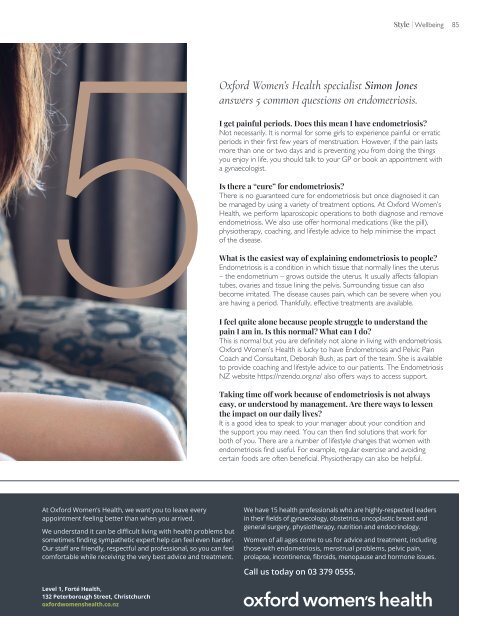You also want an ePaper? Increase the reach of your titles
YUMPU automatically turns print PDFs into web optimized ePapers that Google loves.
<strong>Style</strong> | Wellbeing 85<br />
Oxford Women’s Health specialist Simon Jones<br />
answers 5 common questions on endometriosis.<br />
I get painful periods. Does this mean I have endometriosis?<br />
Not necessarily. It is normal for some girls to experience painful or erratic<br />
periods in their first few years of menstruation. However, if the pain lasts<br />
more than one or two days and is preventing you from doing the things<br />
you enjoy in life, you should talk to your GP or book an appointment with<br />
a gynaecologist.<br />
Is there a “cure” for endometriosis?<br />
There is no guaranteed cure for endometriosis but once diagnosed it can<br />
be managed by using a variety of treatment options. At Oxford Women’s<br />
Health, we perform laparoscopic operations to both diagnose and remove<br />
endometriosis. We also use offer hormonal medications (like the pill),<br />
physiotherapy, coaching, and lifestyle advice to help minimise the impact<br />
of the disease.<br />
What is the easiest way of explaining endometriosis to people?<br />
Endometriosis is a condition in which tissue that normally lines the uterus<br />
– the endometrium – grows outside the uterus. It usually affects fallopian<br />
tubes, ovaries and tissue lining the pelvis. Surrounding tissue can also<br />
become irritated. The disease causes pain, which can be severe when you<br />
are having a period. Thankfully, effective treatments are available.<br />
I feel quite alone because people struggle to understand the<br />
pain I am in. Is this normal? What can I do?<br />
This is normal but you are definitely not alone in living with endometriosis.<br />
Oxford Women’s Health is lucky to have Endometriosis and Pelvic Pain<br />
Coach and Consultant, Deborah Bush, as part of the team. She is available<br />
to provide coaching and lifestyle advice to our patients. The Endometriosis<br />
NZ website https://nzendo.org.nz/ also offers ways to access support.<br />
Taking time off work because of endometriosis is not always<br />
easy, or understood by management. Are there ways to lessen<br />
the impact on our daily lives?<br />
It is a good idea to speak to your manager about your condition and<br />
the support you may need. You can then find solutions that work for<br />
both of you. There are a number of lifestyle changes that women with<br />
endometriosis find useful. For example, regular exercise and avoiding<br />
certain foods are often beneficial. Physiotherapy can also be helpful.<br />
At Oxford Women’s Health, we want you to leave every<br />
appointment feeling better than when you arrived.<br />
We understand it can be difficult living with health problems but<br />
sometimes finding sympathetic expert help can feel even harder.<br />
Our staff are friendly, respectful and professional, so you can feel<br />
comfortable while receiving the very best advice and treatment.<br />
We have 15 health professionals who are highly-respected leaders<br />
in their fields of gynaecology, obstetrics, oncoplastic breast and<br />
general surgery, physiotherapy, nutrition and endocrinology.<br />
Women of all ages come to us for advice and treatment, including<br />
those with endometriosis, menstrual problems, pelvic pain,<br />
prolapse, incontinence, fibroids, menopause and hormone issues.<br />
Call us today on 03 379 0555.<br />
Level 1, Forté Health,<br />
132 Peterborough Street, Christchurch<br />
oxfordwomenshealth.co.nz


















